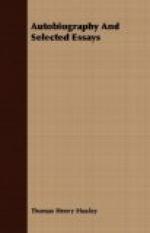The learned Dr. Wallis,[27] writing in 1696, narrates in these words, what happened half a century before, or about 1645. The associates met at Oxford, in the rooms of Dr. Wilkins, who was destined to become a bishop; and subsequently coming together in London, they attracted the notice of the king. And it is a strange evidence of the taste for knowledge which the most obviously worthless of the Stuarts shared with his father and grandfather, that Charles the Second was not content with saying witty things about his philosophers, but did wise things with regard to them. For he not only bestowed upon them such attention as he could spare from his poodles and his mistresses, but, being in his usual state of impecuniosity, begged for them of the Duke of Ormond; and, that step being without effect, gave them Chelsea College, a charter, and a mace: crowning his favours in the best way they could be crowned, by burdening them no further with royal patronage or state interference.
Thus it was that the half-dozen young men, studious of the “New Philosophy,” [28] who met in one another’s lodgings in Oxford or in London, in the middle of the seventeenth century, grew in numerical and in real strength, until, in its latter part, the “Royal Society for the Improvement of Natural Knowledge” had already become famous, and had acquired a claim upon the veneration of Englishmen, which it has ever since retained, as the principal focus of scientific activity in our islands, and the chief champion of the cause it was formed to support.
It was by the aid of the Royal Society [29] that Newton [30] published his Principia. If all the books in the world, except the Philosophical Transactions, [31] were destroyed, it is safe to say that the foundations of physical science would remain unshaken, and that the vast intellectual progress of the last two centuries would be largely, though incompletely, recorded. Nor have any signs of halting or of decrepitude manifested themselves in our own times. As in Dr. Wallis’s days, so in these, “our business is, precluding theology and state affairs, to discourse and consider of philosophical enquiries.” But our “Mathematick”




